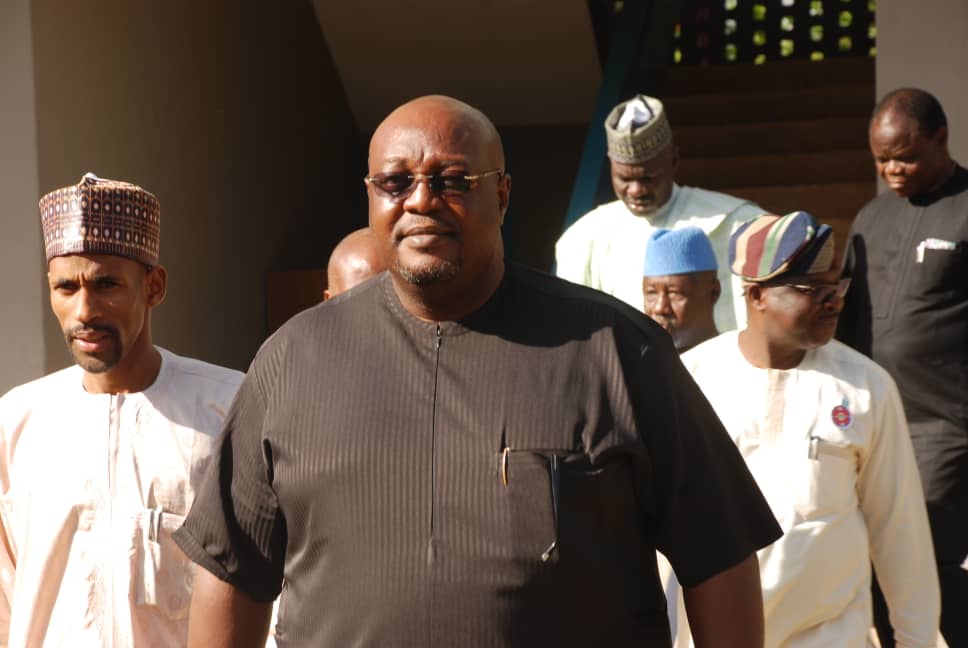
The House Committee Chairman on Aviation, Hon. Nnoli Nnaji, who after a recent public hearing said the aviation industry was one of the most devastated as a result of the coronavirus pandemic and called on the federal government to support airlines with N50 billion to avert their collapse, provided more insights into the proposal by the lawmakers.
The just concluded public hearing on the amendment Bills for the review of some aspects of the civil aviation Acts has brought to the fore the impending crisis in the aviation industry which require urgent attention.
The public hearing, which provided the platform for stakeholders, administrators, aviation agencies, airline operators and different interest groups and labour unions to speak on the problems of the industry was a revelation, which exposed the level of devastation the COVID-19 pandemic has wrought in the sector.
The Chairman of the House Committee on Aviation, Hon. Nnoli Nnaji after presiding over the proceedings, said the industry is in dire need of urgent intervention to save it from imminent collapse.
He noted that during the lockdown the aviation agencies were starved of revenues, which have reverberating effects on their operations and because bills must be paid and salaries must also be paid, the agencies were fiscally left in a quandary. But the airlines seemed to be the most affected because while they put their aircraft into storage they still maintained them without also earning revenue and during the period of the lockdown, some of the aircraft in their fleet were due for checks. Without earning revenues the airlines literally coughed out funds to ferry the aircraft for maintenance.
Airlines as Catalyst
Nnaji stated, “There is no gain saying that aviation is the bedrock of the national economy. It is important to note that aviation industry is regarded as a strategic industry, not only for its potential for economic growth but also for its crucial role in national development and regional integration.
“The most important contribution aviation makes to national economy is through its impact on the performance of other sectors and as a facilitator of their growth.
“The industry is the tonic on which many other sectors depend on. Unfortunately, this vital sector that acts as stimulus to the rest of the sectors of the economy is facing extinction, the consequence of which will be very detrimental to the overall economy of the country if not squarely addressed immediately,” he added.
THISDAY learnt that because of the difficulty in acquiring aircraft due to leasing hurdles put on Nigeria by lessors, airlines need huge funds to acquire their own aircraft, but it is difficult for the operators to access loans from banks, which offers the credit facility with stifling 25 per cent interest rate. This ensures that airlines may not operate profitably at the end of the day.
The House Committee Chairman noted, “In 2019, the contribution of the aviation industry to the nation’s gross domestic product, (GDP) was put at N198.62 billion according to the release from the National Bureau for Statistics, (NBS).
“In fact aviation was adjudged the fastest growing sector for the 2019 despite the harsh operating environment. This was projected to be surpassed in 2020 but for the advent of coronavirus pandemic which dealt a devastating blow on the industry.
“Before the outbreak of COVID-19, the industry, especially the airlines were already crying for intervention from the government to help them surmount the various challenges confronting them.
“The public hearing we held for the six aviation Bills between November 17 and 19 provided the ample opportunity for the indigenous airline operators to voice out their problems which we believe should not be treated with levity if we must move the industry and the economy forward.”

Challenges
According to Nnaji, the operators listed the challenges, which they claimed have been crippling their operations as follows: non implementation of the Executive Order on Zero Customs duty and zero VAT on importation of commercial aircraft and aircraft spare parts; non-implementation of the Executive Order on the removal of VAT from air transportation; inability to access forex; high cost of capital and lack of single digit lending interest rate for airlines.
Before the President Muhammadu Buhari administration took over governance in 2015, there was half-hearted implementation of waivers for the importation of aircraft and spares but the administration made the waiver permanent with the Executive Order and in addition to that, government also introduced zero VAT payment for the airlines.
These waivers were supposed to help the airlines to survive and continue to carry out their service of taking people from place to place, but like in the past, concerned government agencies did not implement the Executive Order, so airlines have continued to pay for VAT and Customs duties against the wish of the federal government.
Nnaji is canvassing for urgent financial deliverance of the airlines and he pointed out other challenges being faced by the domestic operators. For the airlines to survive they listed some amendments, which include replacement of the Nigerian Civil Aviation Authority (NCAA’s) 5 per cent Ticket Sales Charge (TSC) with a fixed charge similar to the Federal Airports Authority of Nigeria (FAAN) Passenger Service Charge (PSC).
They also request for the abrogation of multiplicity of taxes, fees and charges; urgent review of NAICOM (National Insurance Commission) Act on aviation insurance and exceptional permission to grant the externalization of insurance placements for domestic airlines in the country on an exceptional basis in the interest of air transport safety due to inability of Nigerian Insurance Companies to cover aviation risks.
The airlines also requested for the review of the multiple entries and multiple frequencies granted to foreign airlines and depletion of the domestic airline market with loss of jobs. They also decried the unnecessary delays for weeks in clearing of AOG (Aircraft on Ground) spare parts for aircraft, high operating cost (continually rising cost of Jet-A1) and wanted the full implementation of the ease of doing business called on the House of Representatives to interface with the Nigerian Civil Aviation Authority (NCAA) to review the over regulation of domestic airlines.
The airlines also lamented over the inadequate night landing facilities in most of the airports, thereby affecting the operating hours of flight daily.
“As parliament, we are going to look into these demands and more especially to find out why the Nigeria Custom Service would not respect the President’s Executive Order on duty exemption and other palliatives meant to lighten the burdens of the airlines.
“The multiple entries policy for foreign airlines is equally an important concern raised by the operators, which must be looked into.
“If developed countries could give bailouts in billions of dollars to airlines to cushion the impact of corona virus with all incentives at their disposal you can understand what our operators are going through without help. America, Canada, Brazil, Rwanda, Senegal, India, China, Korea, United Kingdom and several European countries all injected funds into the sector to support their local airlines and the service providers because they understand the importance of aviation in their national economies,” Nnaji said.
Financial and Regulatory Support
The House Committee Chairman explained that the International Civil Aviation Organisation, (ICAO) the global aviation watchdog had in the wake of the pandemic canvassed for continued financial and regulatory support, particularly financial relief that does not increase industry debt levels through direct cash injections, credit or loans and deferrals or discounts on user charges to support airlines over the restart and recovery period.
However, only the following African countries; Rwanda, Senegal, Côte d’Ivoire, Burkina Faso and recently Cape Verde have responded adequately to this plea said ICAO Regional Director, Mr. Mohammad All Bakri in a recent publication of the International Air Transport Association, (IATA) journal. Their actions according to ICAO have helped save thousands of jobs and will enable some airlines to restart and support the wider economies they serve in those countries.
As early as May, the International Air Transport Association (IATA) had called for aviation-specific financial relief measures from the government of Nigeria to address the severe impact of the COVID-19 crisis on the air transport sector.
The global body said air transport was grounded as part of efforts to stop the spread of COVID-19. Along with the direct impact on jobs and companies in aviation, related industries including tourism, hospitality and trade have been hit hard, adding that all play an essential role in creating jobs and powering economies.
IATA noted that prior to the crisis, aviation contributed $1.7 billion to Nigeria’s GDP and supported 241,000 jobs. IATA estimates that the COVID-19 crisis puts 124,000 Nigerian jobs at risk and some $900 million of the country’s GDP.
Nnaji said, “The IATA Regional Vice President for Africa and Middle East, Mr. Barry Kasambo in the same publication also acknowledged that the situation of airlines in Africa are worsening and urged that the measures are essential to minimize job losses and ensure that connectivity can be restored within the continent.”
The Chairman, House Committee on Aviation also quoted Kasambo as saying, “We urge African governments and the development institutions which have committed funding to provide it urgently in a structure that does not weaken already stressed airline balance sheets, before it is too late.”
Nnaji added, “Here in Nigeria, our indigenous airlines are faced with enormous challenges like high interest rate on loans, lack of maintenance facilities, high insurance premium, multiple taxation, disadvantageous policies and high cost of jet-A1, (aviation fuel) among others which make it near impossible for them, (local airlines,) to break even. We are not just talking about airlines alone, the service providers, the Federal Airports Authority of Nigeria, (FAAN) the Nigerian Airspace Management Agency, (NAMA!) and the Nigerian Civil Aviation Authority, (NCAA) and the rest are also having their own challenges. They need bailout funds to function optimally.”

Infrastructure
Nnaji noted that the aviation sector requires huge capital for infrastructural development, the remittances of 25 per cent of their internally generated revenues, (IGRs) should be retained for the next ten years to help the agencies upgrade their facilities, adding that the federal government’s N4 billion bailout to the airlines and some palliatives to the agencies (not yet released) was too small.
“The airlines need at least N50 billion bailout funds to cushion the Coronavirus effect. We are requesting that other mechanisms should be introduced as a support to avert the collapse of the Aviation sector.
“We intend to interact with the leadership of the National Assembly and the Ministry of Aviation on all the concerns raised by the operators and other sundry issues confronting the industry to see how we can address them to avert the collapse of the industry. It is important that the federal government urgently come to the aid of the operators by addressing these needs in the overall interest of the national economy and to relieve the airline operators’ of frustration and as well avert their threat of shutting down their operations due to lack of funds and hash operating environment,” Nnaji said.
THISDAY






